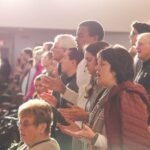Non-denominational churches often have a unique approach to handling membership. Unlike traditional denominations with established membership processes, these churches offer a more flexible and inclusive method. Let’s explore how non-denominational churches manage membership and what sets their approach apart.

Understanding Membership in Non-Denominational Churches
In non-denominational churches, the concept of membership is often less formal compared to traditional denominations. These churches usually focus on building community rather than enforcing strict membership rules. People are typically welcomed to participate in church activities and services without the need for official membership.
This inclusive approach allows individuals to feel part of the church community without the pressure of formal commitments. Consequently, people who are exploring their faith or are new to the church often find this welcoming atmosphere encouraging.
The Process of Becoming a Member
While non-denominational churches may not have a rigid membership process, they still offer ways for individuals to become more involved. For instance, many churches have informal orientation sessions where newcomers can learn about the church’s values and mission. These sessions help people understand how they can contribute and engage with the community.
Additionally, some non-denominational churches offer membership classes or small group meetings. These gatherings provide opportunities for people to meet others, ask questions, and get involved. Even though the process is less formal, these steps help integrate new members into the church community.
Benefits of a Flexible Membership Approach
One major benefit of the flexible membership approach is that it removes barriers to participation. Individuals who may be hesitant to commit to a formal membership process can still engage in church life and contribute to the community. This can lead to a more diverse and dynamic congregation.
Moreover, this approach allows the church to focus on relationships rather than administrative tasks. By emphasizing community involvement and personal connections, non-denominational churches can foster a more supportive and welcoming environment.
How Non-Denominational Churches Engage Members
Engagement is a key focus for non-denominational churches. Since they often do not rely on formal membership, they emphasize creating opportunities for involvement. This can include offering a variety of volunteer roles, organizing community events, and encouraging participation in small groups.
Non-denominational churches also frequently use technology to keep members informed and engaged. Many churches have online platforms where people can sign up for events, access resources, and stay connected with the community. This digital approach helps members remain active even if they are unable to attend in person regularly.
The Role of Leadership in Membership
Leadership in non-denominational churches often plays a crucial role in managing membership. Church leaders typically focus on building relationships and supporting members in their spiritual growth. This relational approach helps create a sense of belonging and encourages active participation.
Leaders also work to ensure that members feel valued and included. By regularly communicating and offering support, they help foster a strong and connected community. This emphasis on personal relationships rather than formal membership helps maintain a vibrant and engaged congregation.
Challenges and Considerations
While the flexible membership approach has many benefits, it also presents some challenges. For example, the lack of formal membership can make it difficult to track attendance and participation levels. This may impact the church’s ability to plan events and allocate resources effectively.
Additionally, without formal membership, it can be challenging to establish a sense of long-term commitment among congregants. Non-denominational churches may need to find creative ways to encourage deeper involvement and ensure that members remain engaged over time.
Conclusion
In conclusion, non-denominational churches handle membership in a unique and flexible way. Their approach focuses on inclusion and community rather than formal commitments. By offering opportunities for involvement and emphasizing personal relationships, these churches create a welcoming environment for all. This flexibility helps them build a diverse and engaged congregation, even as they navigate the challenges of managing membership. As non-denominational churches continue to grow, their approach to membership will likely evolve, further shaping their vibrant and supportive communities.











